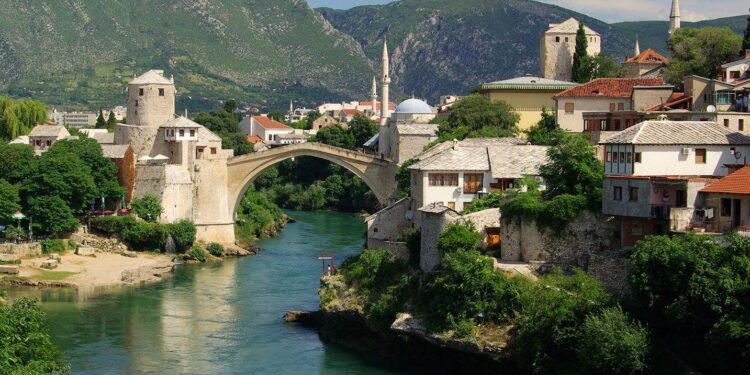Bosnia and Herzegovina’s anticipated return to the Eurovision Song Contest in 2026 appears increasingly uncertain, according to recent developments. Once a regular participant known for memorable performances, the country has faced ongoing challenges that threaten to keep it off the Eurovision stage for the foreseeable future. As fans and industry insiders await official confirmation, the likelihood of Bosnia and Herzegovina’s reentry into the competition continues to wane, raising questions about the future of their participation in one of Europe’s most beloved music events.
Bosnia and Herzegovina’s Eurovision Absence Continues Amid Financial and Organizational Challenges
Bosnia and Herzegovina continues to be absent from the Eurovision Song Contest, as ongoing financial constraints and internal organizational struggles weigh heavily on the national broadcaster’s ability to participate. Despite the growing anticipation among fans for a comeback, the country’s public broadcaster, BHRT, has repeatedly cited a lack of funding and unresolved management issues as critical barriers. The repercussions have left many questioning if Bosnia and Herzegovina will return to the Eurovision stage anytime soon, especially given the increasing costs and logistical demands of the contest.
Key challenges facing BHRT include:
- Budget Shortfalls: Insufficient government support and limited sponsorship options continue to hamper Eurovision-related initiatives.
- Broadcasting Rights Complexity: Navigating rights agreements with the European Broadcasting Union (EBU) has presented ongoing hurdles.
- Organizational Instability: Staff turnover and internal restructuring have delayed strategic planning and participation efforts.
Without substantial changes or increased funding, industry insiders suggest that Bosnia and Herzegovina’s return to Eurovision in 2026 looks increasingly unlikely, prolonging the nation’s absence from one of Europe’s biggest cultural celebrations.
| Year | Participation Status | Main Reason for Absence |
|---|---|---|
| 2016 | Participated | Complete participation |
| 2017-2025 | Absent | Financial and organizational challenges |
| 2026? | Uncertain | Pending resolution of internal issues |
Analyzing the Impact of Prolonged Eurovision Hiatus on the Nation’s Music Scene
The extended break from Eurovision has left a noticeable void in Bosnia and Herzegovina’s vibrant music landscape. Once a pivotal platform for showcasing emerging talents and blending traditional Balkan sounds with contemporary pop trends, the absence has limited visibility for local artists on an international stage. Music producers and industry experts warn that this hiatus risks isolating the country’s music scene from broader European influences, potentially slowing innovation and collaboration. The Eurovision stage was more than just a competition; it was a springboard for many musicians who sought cross-border audiences and fresh stylistic inspiration.
Despite the challenges, some sectors within the industry are striving to adapt through alternative channels:
- Regional collaborations: Artists partnering with neighbors to keep cross-cultural exchange alive.
- Digital platforms: Increased reliance on streaming services and social media to reach audiences.
- National festivals: Enhanced promotion of local music events to sustain domestic interest.
However, experts emphasize that none of these can fully replicate the unique exposure and momentum that Eurovision generates. The table below summarizes key metrics reflecting shifts in Bosnia and Herzegovina’s music market from 2016 to 2024, highlighting the tangible impact of the absence on artist growth and audience reach.
| Year | New Artist Albums Released | Streaming Growth % | International Collaborations |
|---|---|---|---|
| 2016 | 28 | 18% | 12 |
| 2018 | 32 | 22% | 15 |
| 2020 | 21 | 14% | 7 |
| 2022 | 17 | 10% | 4 |
| 2024 | 15 | 8% | 3 |
The provided section outlines the impact of Bosnia and Herzegovina’s extended absence from Eurovision on its music industry, emphasizing how the hiatus has affected local artists’ visibility, international collaboration, and innovation within the vibrant Balkan music scene.
Key Points:
- Eurovision’s Role:
Historically, Eurovision served as a vital platform for Bosnian artists to gain international exposure and blend traditional sounds with contemporary trends. It functioned as a springboard for many musicians seeking larger audiences and stylistic evolution.
- Impact of Hiatus:
Music producers and industry experts caution that the absence risks cultural isolation, slowing artistic innovation and limiting collaboration beyond national borders.
- Adaptive Strategies:
In response, the industry has turned to:
– Regional collaborations to maintain cross-border creative exchanges.
– Digital platforms like streaming services and social media for audience engagement.
– National festivals to boost domestic interest in local music.
- Limitations of Alternatives:
Despite these efforts, experts agree that these channels cannot fully replace Eurovision’s unique exposure and growth opportunities.
Data from the Table (2016-2024):
| Year | New Artist Albums Released | Streaming Growth % | International Collaborations |
|——-|—————————-|——————–|——————————|
| 2016 | 28 | 18% | 12 |
| 2018 | 32 | 22% | 15 |
| 2020 | 21 | 14% | 7 |
| 2022 | 17 | 10% | 4 |
| 2024 | 15 | 8% | 3 |
- Trends Noted:
– Both new album releases and streaming growth show a decline post-2018, corresponding with the Eurovision hiatus period.
– International collaborations have steadily decreased, indicating reduced cross-border partnerships.
This data supports the narrative that Eurovision’s absence has tangibly impacted artist output, streaming popularity, and collaborative opportunities in Bosnia and Herzegovina’s music industry.
Strategies and Recommendations for Reviving Bosnia and Herzegovina’s Eurovision Participation
To rekindle Bosnia and Herzegovina’s presence on the Eurovision stage, a multifaceted approach is essential. Revamping the national selection process by incorporating public engagement through televoting alongside professional juries could boost transparency and enthusiasm. Additionally, investing in emerging local talent and fostering collaborations with established regional artists will not only elevate the quality of entries but also generate wider public interest. Crucially, increased financial support from broadcasters and government bodies is needed to ensure competitive staging and promotion at the international level.
Key strategies to consider include:
- Developing a sustainable funding model with sponsorships and partnerships
- Launching targeted social media campaigns to reconnect with the Eurovision fanbase
- Organizing songwriting camps to encourage fresh, diverse musical contributions
- Creating a transparent feedback mechanism for artists and audiences alike
- Strengthening cooperation with neighboring countries for production resources
| Category | Suggested Action | Expected Impact |
|---|---|---|
| Funding | Seek private sponsorships | Improved stage production |
| Artist Development | Host workshops and camps | Higher quality entries |
| Audience Engagement | Interactive voting platforms | Increased public support |
The Way Forward
As Bosnia and Herzegovina’s potential return to Eurovision 2026 grows more uncertain, fans and observers are left questioning what the future holds for the nation’s participation in the iconic contest. With ongoing financial and organizational challenges, the path back to the Eurovision stage appears increasingly complicated. Eurovision enthusiasts will continue to watch closely, hoping for positive developments that could see Bosnia and Herzegovina reclaim its place in the competition once again. For the latest updates and in-depth coverage, stay tuned to eurovisionfun.com.
















